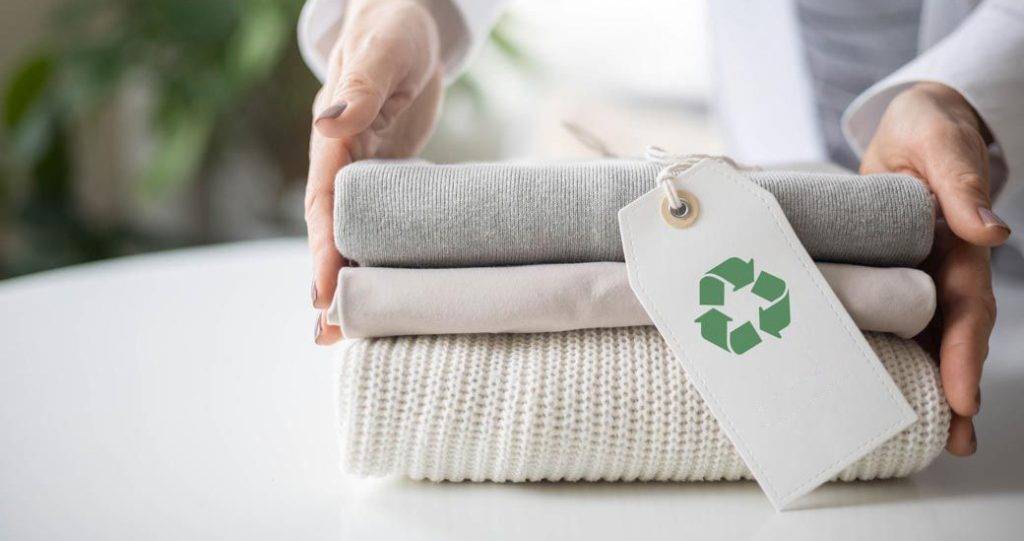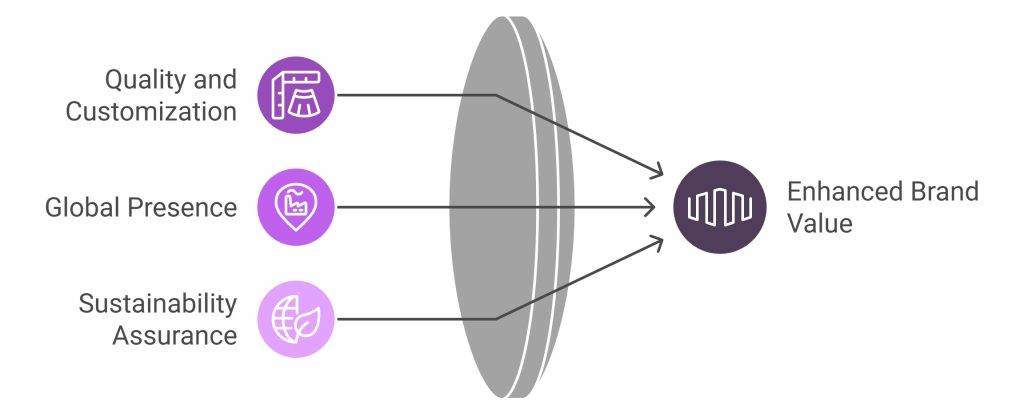In recent years, sustainability has become a buzzword in the fashion industry. Sportswear and denim manufacturers like us recognize the need to adopt sustainable practices to reduce their environmental footprint and promote ethical production. In this article, we will explore what sustainable fashion is and why fashion brands should prioritize sustainability. We will also look at how Pearl Global, as a leading sustainable clothing manufacturer, can help you to become more sustainable.
What Does Sustainable Fashion Really Mean

Sustainable fashion refers to the practice of designing, producing, and distributing clothing in ways that reduce environmental impact and uphold ethical standards. It includes the use of eco-friendly materials such as organic cotton and recycled fabrics, fair labor practices, and efforts to minimize waste through recycling and long-lasting design. Transparency in sourcing and production is also a key element. Overall, sustainable fashion aims to create a more responsible and balanced approach to clothing that supports both people and the environment.
Pearl Global, a leading name in India as well as American clothing manufacturers, has been progressively embracing supportable style practices to fulfill the developing customer need for eco-accommodating and morally made items. As a conspicuous player in the circle of USA clothing manufacturers, we combine manageable techniques through our creation strategy. From sourcing cotton and reused textures to utilizing energy-effective assembling methods, Pearl Global is setting new standards for sustainability in the fashion industry. Our commitment to sustainable fashion not only contributes to the preservation of the environment but also ensures the well-being of production workers.
The Importance of Sustainable Fashion
Sustainable fashion matters because it tackles the serious environmental and ethical issues linked to traditional clothing production. The industry has long been criticized for pollution, waste, and unfair labor practices—but sustainable fashion offers a better way forward. Here’s why it’s important:
1. Environmental Protection
The fashion industry ranks among the largest polluters, contributing to excessive water consumption, the use of harmful chemicals, and significant waste. Sustainable fashion aims to cut down this impact by utilizing natural or recycled materials and adopting cleaner production techniques, which help lower carbon emissions and conserve resources.
2. Social Responsibility
Fast fashion frequently has a human cost—low pay, risky workplaces, and labor abuse. Sustainable fashion focuses on equity, making sure that workers receive a fair wage and are treated with dignity in safe settings. It also promotes transparency throughout the whole supply chain.
3. Resource Conservation
The planet has limited natural resources. Sustainable fashion encourages the use of durable materials, upcycling, and recycling to prolong the life of clothing and reduce reliance on virgin resources such as water, cotton, and fossil fuels.
4. Lower Carbon Footprint
Apparel production plays a major role in contributing to greenhouse gas emissions worldwide. By adopting sustainable methods—such as energy-efficient manufacturing processes and environmentally friendly material selections—we can reduce this impact, making the fashion industry less harmful to our planet.
5. Consumer Awareness & Empowerment
Today’s consumers are increasingly knowledgeable and focused on values. By choosing sustainable choices, they back ethical brands and encourage the industry to be more accountable. Consumers are eager to learn about where their clothes come from and the processes behind their production.
6. Business & Economic Benefits
For fashion companies, sustainability is not only an ethical choice but also a wise strategy. It minimizes waste and energy expenses, while simultaneously creating opportunities in innovative markets, materials, and design methods. It addresses the growing demand for environmentally friendly fashion, providing brands with a competitive advantage.
7. Long-Term Sustainability
Sustainable fashion promotes a circular economy by creating garments that can be reused, repaired, or recycled. This reduces the pressure to constantly produce new items, helping in resource conservation and minimizing landfill waste.
Eco-Friendly Materials and Production Processes
The fashion industry is steadily shifting toward more sustainable practices, focusing on both eco-friendly materials and cleaner production methods. Brands are now using materials like organic cotton, recycled polyester, and hemp, which are less harmful to the environment yet still meet quality expectations.
Sustainability extends beyond fabric choice. Many manufacturers are adopting zero-waste techniques, energy-efficient systems, and water-saving technologies to reduce their carbon footprint. These efforts reflect a broader commitment to responsible fashion that benefits both the environment and future generations.
The Role of Fashion Brands in Driving Change
Fashion brands have a unique opportunity to drive change in the industry by leading the way in sustainable practices. By implementing environmentally conscious strategies, brands can influence their suppliers, sustainable clothing manufacturers, and customers to embrace sustainability. This proactive approach can help shape a more responsible and ethical fashion industry as a whole.
Pearl Global’s Contribution to Sustainability: One of the prominent players in sustainable clothing manufacturing is Pearl Global. They have established themselves as leaders in sustainable practices within the fashion industry. Pearl Global’s commitment to sustainability can be seen in various aspects of its operations:
Use of Sustainable Materials: Pearl Global prioritizes the use of sustainable materials such as organic cotton, recycled polyester, and eco-friendly dyes. This reduces the environmental impact of their manufacturing processes while maintaining high-quality standards.
Ethical Labor Practices: As a responsible manufacturer and apparel vendor, Pearl Global ensures fair treatment and safe working conditions for its employees. They uphold the highest ethical standards, complying with international labor regulations and promoting a positive work environment.
Efforts in Waste Reduction: Pearl Global implements measures to reduce waste throughout the production process, minimizing the negative impact on the environment. They actively seek innovative solutions to repurpose or recycle textile waste.
Certifications and Recognition: Pearl Global has received multiple certifications and recognition for its sustainable practices. They are certified by GOTS (Global Organic Textile Standard), and OEKO-TEX, and have achieved LEED (Leadership in Energy and Environmental Design) certification for their green factories.
Choosing Pearl Global as your Sustainability Partner
Fashion brands aiming for sustainability should consider Pearl Global as their trusted manufacturing partner. As one of the leading clothing manufacturers in USA, we prioritize eco-friendly processes and ethical labor practices. Our commitment to sustainability is evident in our use of organic fabrics and waste-reduction techniques. With Pearl Global, you get bespoke solutions tailored to your brand’s needs. As experienced custom clothing manufacturers, we ensure your apparel is produced responsibly. Partner with us to create fashion that looks good and does good.
Partnering with Pearl Global offers several advantages

Quality and Customization
Pearl Global provides high-quality clothing items for men, women, and children. Their expertise in design and manufacturing allows brands to create customized solutions tailored to their unique requirements.
Global Presence
With manufacturing facilities in multiple countries, including India, Bangladesh, Vietnam, Hong Kong, Spain, UK, USA, and Indonesia, Pearl Global facilitates global reach for brands seeking to expand their markets.
Sustainability Assurance
Brands partnering with Pearl Global can be assured that their products are manufactured in line with sustainable practices. By choosing Pearl Global, brands demonstrate their commitment to sustainability and environmental responsibility.
Conclusion
Sustainable fashion is more than just a passing trend, It is a necessity for the fashion industry to mitigate its impact on the environment and uphold ethical standards. Fashion brands play a crucial role in driving the adoption of sustainable practices, and partnering with manufacturers like Pearl Global can help accelerate the transition towards a more sustainable future.
By choosing Pearl Global as your sustainable clothing manufacturer, brands can take advantage of their expertise in sustainable materials, ethical labor practices, waste reduction, and their commitment to promoting a greener fashion industry.

